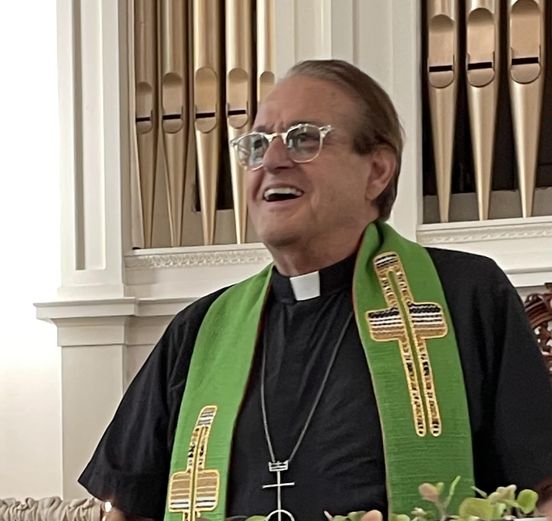Sermon Sunday November 17, 2024
Rev. Norman A. Michaud
“When Temples Fall”
Mark 13: 1-8
As Mark tells the story, Jesus spoke these words in today’s passage from the beginning of chapter 13 at what would have been the Tuesday before his arrest and crucifixion. He and the disciples were standing near the temple. The new white marble walls of Herod the Great’s temple glisten in the bright sunshine. The temple walls were covered with sheets of gold and brilliantly reflected the sun. Josephus, the Jewish historian whose writing was contemporary to Jesus’ teaching, wrote that the gold on the temple “reflected so fierce a blaze of fire that those who tried to look at it were forced to turn away. . . . It seemed in the distance like a mountain covered in snow, for any part not covered in gold was dazzling white.”
During the week of Passover, Jerusalem’s population exploded as pilgrims arrived. There was heavy traffic, selling and buying. Money poured into the city—crowds of pilgrims, priests, beasts, cash-filled businesses, and temples. The temple was at its full grandeur and represented the power of Herod. The temple was the earthly center of God’s kingdom for Jews.
An unnamed disciple spoke. “Look, Teacher, what large stones and what large buildings!’ Jesus responded, “Not one stone will be left here upon another; all will be thrown down.” Those within earshot must have been stunned and afraid.
Seeing the breathtaking grandeur in the bustling city, those who heard must have been overtaken by a vision of the desolation of everything in sight. It would have been like the awe and disappointment experienced by those who saw the original Planet of the Apes when astronaut George Taylor, played by Charlton Heston, sees the broken Statue of Liberty and realizes that he is on Earth, not some random planet. In our lifetimes, we witness such destruction on 09/11 and 01/06. How could symbols of American wealth and power be vulnerable to attacks that shatter our sense of power in our world?
Jesus looked past the swarm of visitors and the grandeur and saw ruins. Filled with fear, the disciples asked, “When will this be? And what will be the sign that this will take place?” Only God could know the time and place. For them, Jesus was still Jesus and not yet the Resurrected Christ.
Every generation of believers struggles with such questions. To those who fear that the End is approaching, Jesus speaks with unwavering certainty and straightforward advice. He warns of misleading voices and contorted messages intended to strike fear in our hearts. He does not pretend that chaos will end. He is clear that chaos will come. He says that such chaos is “… but the beginning of birth pangs.”
Christian fear-mongers heighten hysteria in every generation with their warnings. They say things like, “The End is Near.” Jesus warns us, “Do not go after them.” Do not be terrified.
Towering buildings are not supposed to crumble to the ground, oceans are not supposed to leap out of their seabeds and flood miles inland, and the ground is not supposed to shake and undulate. Storms are not expected to wipe away towns with winds and flooding rains.
Yet all who have watched the World Trade Towers collapse, seen a tsunami flood a nation, experienced an earthquake, or suffered through the power of a storm know that such events happen. Survivors suffer a profound loss of innocence. The poet William Butler Yeats captured this sense of lost innocence in his poem “The Second Coming”:
“Turning and turning in the widening gyre The falcon cannot hear the falconer;
Things fall apart; the center cannot hold;
Mere anarchy is loosed upon the world,
The blood-dimmed tide is loosed, and everywhere
The ceremony of innocence is drowned.”
As Jesus and his disciples sit together on the Mount of Olives and take in the splendor of the glistening temple, the disciples must have found Jesus’ words difficult to imagine. Peter, James, John, and Andrew take Jesus aside and privately ask when his prediction will come to pass. Jesus warns them not to be led astray by others who will go after him, including some who claim to speak with Jesus’ authority. Jesus tells the disciples not to be “alarmed by wars, rumors of wars, earthquakes, or famine” that some will exploit as divine signs of the beginning of the End.
Jesus does not answer the disciples’ questions directly. Jesus directs them to live in his way of love. Fear-mongering can be applied to every natural or human-made disaster. We smile today when we recall those who proclaimed twenty-four years ago that Y2K would end our civilization and that our destruction was imminent. The New Year and new century and the collapse of computers were supposed to end our age. As with all such predictions, nothing happened. Those who had predicted the End seemed foolish and went on to the next End of the World declarations as they have for centuries.
Every generation has heard voices proclaiming they are privy to insider knowledge regarding Christ’s return. Such declarations make the End of Times attractive and treacherous. Nineteenth-century pronouncements that the Earth is 6,000 years old or that the Rapture was prophesied in the New Testament are inventions. Still, many Christians continue to relate these as Christian truths.
Like the disciples, we can become so focused on discerning the signs of the times that we neglect our more important mission: to follow the Good News as Jesus told it. His death and resurrection gave everyone the opportunity to live life abundantly and no longer fear death. Christ came to save all from turning from God.
How does one live amid voices claiming that such losses are signs of the End of all they know and love? Jesus calls us not to focus on such signs but on the realm of love and peace he promises. Jesus asks us to look to God after such devastation and remain grateful for our blessings. Things may fall apart. It may appear that anarchy has been loosed on the world. Nevertheless, the center will hold much to our amazement. We discover that we have much faithful work to do guided by our love of neighbor, ourselves, and God.
When he first appeared to the disciples after the resurrection, Jesus told them, “Peace be with you.” Peace—not chaos and confusion, not fearfulness and trembling. Jesus came to convey that peace will be found amid hardship.
Jesus warned that the future would not be secure. He pointed to a time that was coming when the children of God would not be safe from evil in the world. Arrests and persecution were the ways the world announced its opposition to the Good News of God’s reconciling love through Jesus. Most of us have experienced no persecution. Persecution has come in the past and will come again.
Jesus promises that when our moment of truth comes, we need not fear that we will lack the courage to say what is needed. The presence of God, through the Holy Spirit, will be with us and will provide the words we need to say to protect the persecuted. Christ offers all his peace as a gift of grace.
When one of us takes the hand of another and says, “May the peace of Christ be with you,” and the other responds, “And with you,” we testify to Christ’s peace. We prove to the unbelieving world that we are God’s people.


